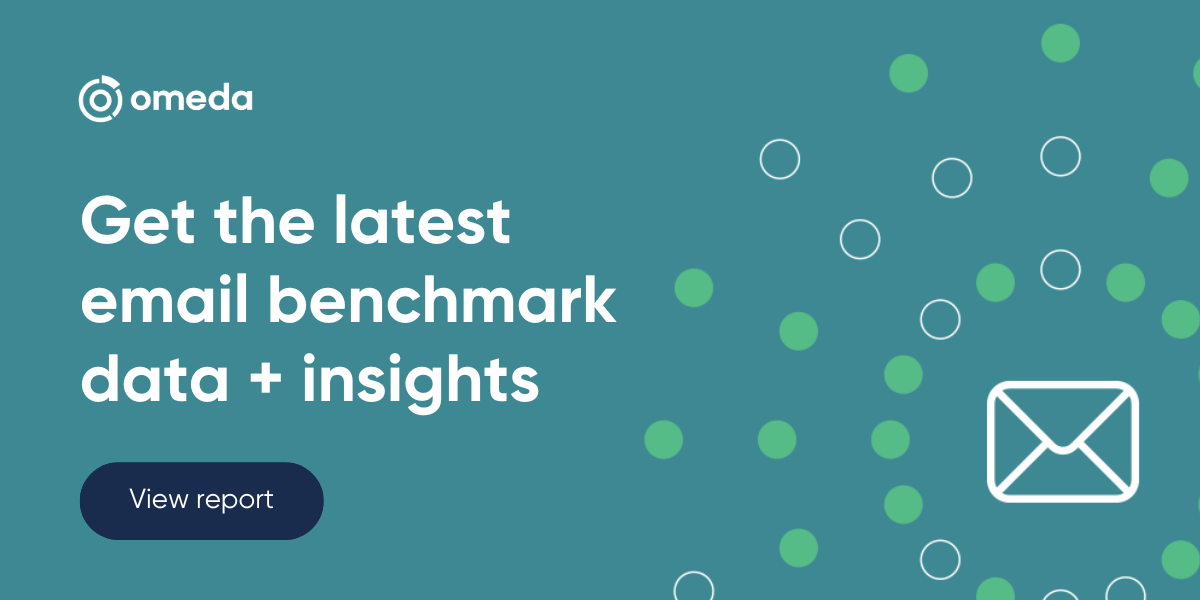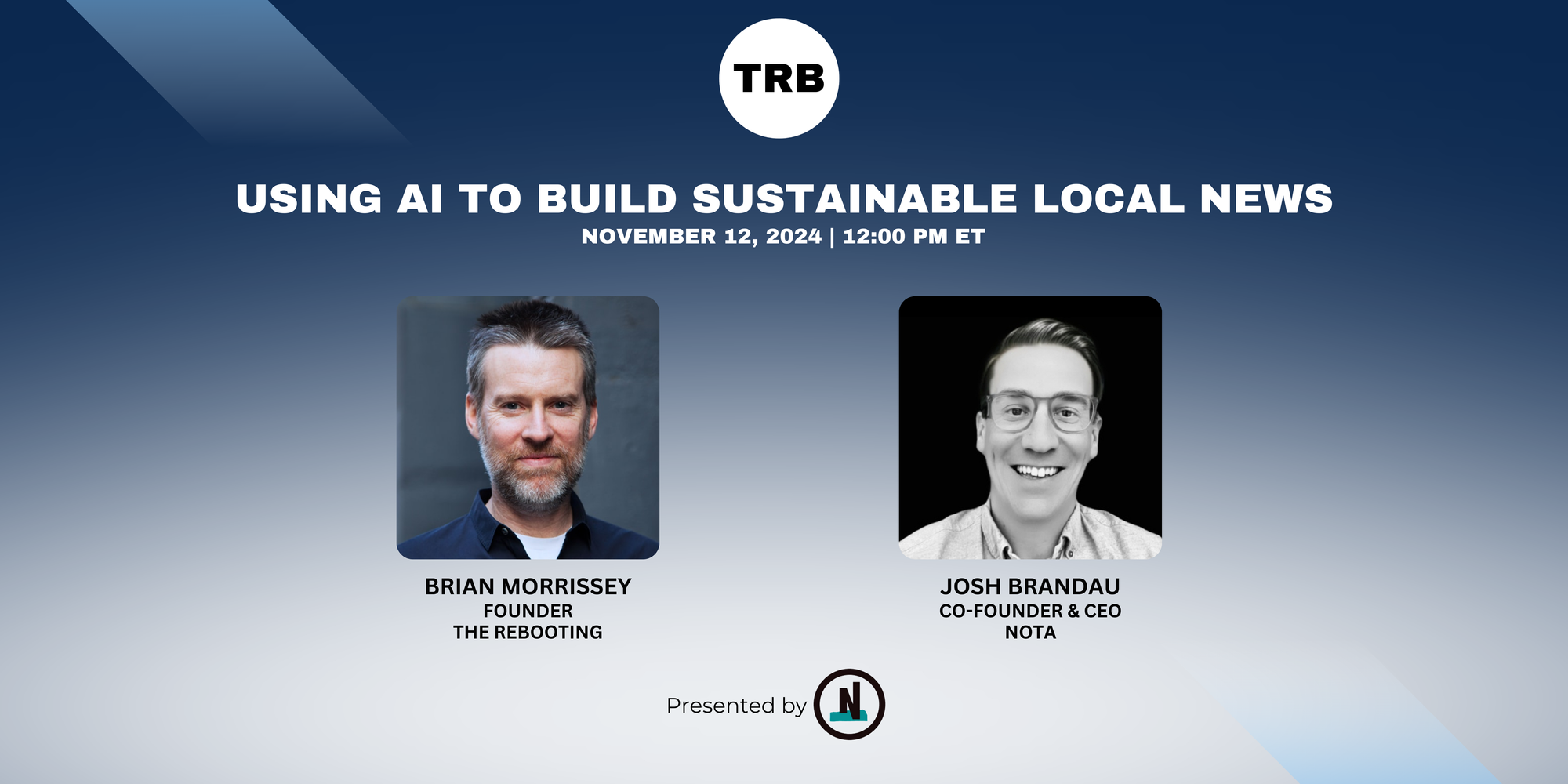Complexifiers
The news business is

Today at 1pm, I’ll be joined by BlueConic’s Patrick Crane and Actable’s Craig Schinn to discuss how publishers can take control of their first-party data. Some of the topics we will discuss:
- Why getting to start is critical. Too many publishers kick the can down the road.
- How to create a true value exchange for people to give their information
- Thinking beyond reg walls to get logged-in users
If you can’t make it today, all those registered will get a link to the replay.
In today’s issue:
- Find out what’s driving email opens
- The complexifiers of news
- A conversation about AI in the newsroom

Discover what's driving email engagement

Evaluate your email performance with benchmark data from 1.9 billion emails sent through Omeda’s email platform in the third quarter of 2024. This report provides insights on opens, clicks, and CTR, along with strategies from Omeda to mitigate subscriber fatigue, featuring examples from legacy media and indie newsletter senders like you. The report digs into the data to understand whether decreased overall engagement is a sign of subscriber fatigue.
Complexifiers
In his defense of his decision to quash an endorsement of Kamala Harris, Jeff Bezos used the word “complexifier” to describe his ownership of The Washington Post. He’s used this a few times to describe the obvious conflicts to the world’s third-richest person owning a top news operation.
The challenge with news publishers is they’re filled with complexities and contradictions without the added complexifiers. It’s already complex to balance a mission with a profitable business, not to mention speaking truth to power while not shrinking your potential audience, and underscoring it all is the complexity of developing a North Star for businesses that by necessity try to serve multiple masters.
I’ve long found Bezos an interesting oligarch, at least within his competitive set. His early tenure at the Post offered hope that needed innovation would be brought to a critical industry in need of a jolt. There were early flashes of promise, yet Bezos seemed to either lose interest or, worse, not have many groundbreaking ideas for how to build a thriving news business.
After all, it isn’t as if Bezos bought a distressed asset. In the language of the time, the Post is a great brand. It is centered in a massive market. Washington DC is still the center of the universe. From the time Bezos bought it for $250 million, the U.S. economy is 70% larger. Politico, Axios, Punchbowl and to a lesser degree Semafor and Puck have shown how the business of the U.S. government is great business. Their rich-niche growth has come in the Post’s backyard.
Some of the early innovations at the Post were decidedly incremental. One that was cited was a homegrown technology to serve Kindle ads. The Post did pour money into tech, eventually spinning out its own CMS and ad tools. It has gotten out of the latter business and recently made cuts at Arc.
These kinds of side businesses are themselves complexifiers. The vogue for acting like tech companies – let us never forget the horrendous term platisher – never panned out.
Subscriptions have been a promising way to iron out some of these complexifiers. The New York Times has shown the way in organizing its business around creating a product that the audience is willing to pay for. It has surrounded that with lifestyle offshoots. The Atlantic and The New Yorker have had their own successes. Business news is, as always, a different story, as they’re frequently dealing with Other People’s Money because the subscriptions can be expensed.
What’s become apparent for many news publishers is subscriptions themselves are a complexifier in this political environment. The market in the aftermath of the 2016 election sent clear signals that the quickest path to growing subscriptions was to cut the market in half politically and join the resistance.
That was always going to lead to audience capture. It’s why the Times has periodically undergone cancelation waves, like when it published a Tom Cotton op-ed calling for a crackdown on racial justice protestors. The Times chose to make a business decision and oust James Bennet.
The Post’s “Democracy Dies in Darkness” positioning was something of a promise to readers, so you can understand why they’d feel the rug pulled from under them. The volte-face that Bezos has dressed up in highfalutin fairness language is not going to win the day with ardent Trump opponents who see only cowardice in the face of fascism. Cancellations are now up to 250,000.
As Semafor’s Ben Smith has pointed out, following the data means toeing the line. Endorsements are a lot like the homepage. They serve a brand-positioning role. And news in a time of Trumpism is inherently political.
It is hard not to get pulled into the political votex.I was reminded of that this morning when I got an email that my own annoyingly middle-of-the-road take on Tuesday was “normalizing Trump.”
done with you for this
"This can be seen as “bending the knee” to Trump or a needed correction."
mealy mouthed bullshit about fascism means canceled (free) subscription and I'll never give you a dime.
Bye
(Side note: If you upgrade to a TRB Pro membership, I can assure you these newsletters will not become about partisan political bickering. I’m only interested in politics as they apply to my focus on building sustainable media businesses. The Rebooting has chosen for the second presidential cycle to skip endorsements. That will not change.)
Trump is the ultimate complexifier for the news business. I would love to say it’s obvious that news publishers will be rewarded for taking evenhanded approaches and avoiding, as Bezos says, the appearance of political bias. Yet the evidence I see points in the opposite direction.
The crack up of mass media will have several knock-on effects. One could be a return to the partisanship of news media that was far more common in previous times. We sometimes forget that the convention of nonpartisan news is a fairly recent phenomenon. American newspapers were overtly partisan. Glance down the most popular podcasts and newsletters, and you’ll find few that try to occupy a middle ground. The market incentives in the Information Space are to pick a side.
Just look at how smartly opportunistic publishers capitalized on the Post’s hemorrhaging subscribers to gain paying readers. I have yet to see any evidence that he has paid a political price for stoking distrust in the news media. And by the same token, the only business cost I’ve seen in the news industry is when outlets attempt to balance their coverage with perspectives from both sides. Wasn’t that the conceit of The Messenger?
If Trump is reelected, news businesses will be presented with yet another complexifier. Do they return to the resistance approach that all evidence suggests worked well, or do they accommodate themselves to the reality of his presidency? In reality, it’s not a binary choice. I don’t think the market will be as big for the stories with 37 anonymous sources that tell us people within the administration are fighting and Trump is “raging” about this or that. There’s wearout.
And all of this takes places against the backdrop of structural changes to the information marketplace, with far more to come at the hands of AI, that will make this businesses even more complex to operate.
AI in the newsroom in the more-with-less era

The discussion around AI and the news business typically focuses on the downsides and fear. But AI offers publishers the ability to streamline their processes in order to devote resources to differentiated and impactful journalism. In recent research The Rebooting did, we found that 49% of publishers saw efficiency gains as the top opportunity for the application of AI in their businesses.
On Nov 12 at noonET, I will be joined by Nota CEO Josh Brandau to dive into how publishers are using AI in the newsroom. In this Online Forum, we’ll cover:
- How to streamline operations while enhancing the reader experience
- Focusing resources on impactful journalism
- How publishers are negotiating with AI companies for payments – and what it means for those who aren’t the biggest players
Whether you’re a small publication or a large media organization, this conversation will uncover practical, responsible AI strategies to balance innovation with trust, drive engagement and profitability.
If you cannot make the session, you'll get a link to the replay by registering.
Thanks for reading. If you have any non-political feedback, please send me a note by hitting reply or emailing me at bmorrissey@therebooting.com.




